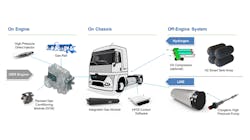Volvo, Westport plan joint venture to commercialize HDPI alt-fuel engines
Volvo Group and Westport Fuel Systems, a supplier of advanced alternative fuel delivery systems and components, have signed a nonbinding letter of intent to establish a joint venture to accelerate the commercialization and global adoption of Westport's HPDI fuel system technology for long-haul and off-road applications.
Westport’s HPDI fuel system is a high-performance solution supporting significant carbon reductions in hard-to-abate sectors like heavy-duty and off-road mobility, according to a joint release from the companies. HPDI enables trucking and off-road equipment manufacturers to address the challenges of meeting the regulatory requirements of Euro 7 and the U.S. Environmental Protection Agency while offering end users affordable options that are powered by carbon neutral fuels like biogas, zero carbon fuels like green hydrogen, and other renewable fuels.
While Volvo will be a key customer of the joint venture, the joint venture's mandate will be to enhance the commercialization of HPDI through the addition of new trucking and equipment manufacturers as customers, according to the release.
Westport will contribute current HPDI assets and activities including related fixed assets, intellectual property, and business into the joint venture. Volvo will acquire a 45% interest in the joint venture for about $28 million plus up to an additional $45 million, depending on the performance of the venture.
Read more: 2023 alternative fuel engine outlook
Volvo’s goal is to reach net-zero greenhouse gas emission-enabled products, solutions, and services by 2040, according to the company. Volvo pushes a three-pronged approach: battery-electric, fuel-cell electric, and internal combustion engines.
“Decarbonization with internal combustion engines running on renewable fuels, especially with HPDI, plays an important part in sustainable solutions. HPDI has been on the road in Volvo trucks for over five years and is a proven technology that allows customers to significantly reduce CO2 emissions in LBG (Liquefied Biogas) applications here and now and is a potential avenue for hydrogen,” said Lars Stenqvist, chief technology officer at Volvo.
“Westport is advancing fuel system solutions to help our customers affordably address the most pressing challenge of carbon reduction while continuing to utilize existing manufacturing infrastructure,” said Westport CEO David Johnson. “The joint venture with Volvo is a natural extension of both companies’ commitment to accelerating global carbon reduction and we are proud to partner with such a bold supporter of the future of the internal combustion engine.”
Completion of the joint venture is conditional on the successful negotiations and execution of a definitive investment agreement, joint venture agreement, supply agreement and development agreement, according to the release. The venture is expected to launch in the first half of 2024.
Benefits of HDPI
According to Westport, HDPI uses direct injection and relys on high pressures in the combustion chamber for ignition, both of which help engines achieve higher horsepower and torque. The HPDI fuel system is similar to a diesel engine in terms of efficiency, reliability, and engine architecture, which offers familiarity to manufacturers and technicians and provides supply chain benefits, while fleet customers can achieve lower emissions output.
Westport’s Liquid Natural Gas (LNG) HPDI fuel system offers OEMs the flexibility to differentiate their natural gas and biogas product lines while maintaining full commonality with conventional engines and powertrain lines. An LNG HPDI fuel system-equipped engine, fueled with a blend of 60% natural gas including 40% biogas, delivers the same life cycle CO2 reductions as fuel cells using blue/green hydrogen blends. It can also deliver net zero well-to-wheels CO2 emissions, with 100% biogas, which is becoming the predominant fuel for LNG trucks in many parts of Europe. Additionally, Westport’s LNG HDPI is meant to meet or exceed the capabilities of spark-ignited H2 ICE systems, diesel engines, and fuel cells.
According to the company, the H2 HPDI fuel system leverages Westport's experience with LNG and provides even more advantages:
• Up to 20% more power than diesel
• Up to 18% more torque than diesel
• Near zero CO2 emissions
• Preserves existing diesel engine architecture
• Preserves existing engine manufacturing infrastructure and investment
• Lowest cost to achieve CO2 compliance

